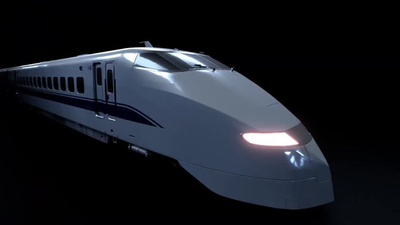
Imagine traveling from New York to Los Angeles in less than an hour or from London to Paris in 15 minutes.
Sounds impossible, right? Well, not for China’s biggest missile manufacturer, which claims to have built the fastest train ever.
The China Aerospace Science and Industry Corporation (CASIC) has been working on a hyperloop train that can hit incredibly high speeds in a vacuum.
The idea is to take a confined tube – big enough to fit a train – and suck all the air out so that there’s no air drag to slow you down.
A hyperloop train is based on the concept of a vactrain, which is a train that travels in a vacuum tube, using magnetic levitation (maglev) to float above the tracks and reduce friction. A hyperloop train is essentially a vactrain on steroids. It uses superconducting magnets to create a powerful magnetic field that propels the train forward. It also uses a linear motor to accelerate and decelerate the train and a compressor to suck the remaining air out of the tube.
The result is a train that can travel at hypersonic speeds, with minimal energy consumption and environmental impact. A hyperloop train could potentially transport passengers and cargo across continents in minutes, revolutionizing the transportation industry.
So far, the CASIC China Aerospace Science and Industry Corporation has built a 1.24-mile test line in Datong, Shanxi province, where the train hit a record speed of 387 mph. CASIC is happy with this test, saying it validated the interaction between the test tube, the vehicle and the track. But it’s certainly not done.
Phase 2 of this project is to extend the tracks to 37 miles to hit a target speed of 621 mph. If all goes well, then the futuristic ambitions for the train are to hit 1,243 mph. After that, well, it might make sense to connect Datong with Beijing – a 215-mile, four hour-plus drive that might be slashed to less than half an hour in a hyperloop train.
While a hyperloop train sounds like a great way to travel very fast, there are some financial and safety concerns to be considered. First of all, building a hyperloop train is not cheap. The cost of constructing a vacuum tube, a maglev system, a linear motor and a compressor is estimated to be billions of dollars. The maintenance and operation costs are also likely to be high, as the system requires constant monitoring and testing.
Secondly, a hyperloop train is not foolproof. There are many potential hazards and failures that could endanger the passengers and the system. For example, a power outage, a leak, a fire, a terrorist attack or a human error could cause a catastrophic accident. The high speed and acceleration of the train could also cause discomfort or health issues for the passengers, such as motion sickness, nausea or ear pain.
Thirdly, there are many legal and regulatory barriers that could hinder the development and deployment of a hyperloop train. For instance, the land acquisition, the environmental impact, the safety standards, the liability issues and public opinion could pose significant challenges for the hyperloop train project.
Despite the challenges and risks, the hyperloop train is not a pipe dream. CASIC is not the only player in the Hyperloop train game. Several other companies and organizations are also working on their own versions of the hyperloop train. The race is on to see who can make the hyperloop train a reality.
However, it’s worth noting that Hyperloop One, a company that once promised high-speed transit between cities using specially designed pods, has recently shut down without ever carrying a single passenger. Based on Elon Musk’s idea, the startup burned through more than $450 million without coming close to a commercial project. This setback highlights the immense challenges faced by hyperloop projects, even with substantial backing and ambitious goals.
Even so, CASIC plans to complete its phase two test by 2025 and aims to achieve its ultimate goal of 1,243 mph by 2030. If successful, CASIC could make history by creating the fastest train ever. But will it be the best train ever? That remains to be seen. A hyperloop train may offer unprecedented speed and efficiency, but it may also come with a hefty price tag and a high-risk factor.
The hyperloop train is an innovative idea that could change the way people travel and connect with each other in China and other parts of the world. It could offer unprecedented speed, efficiency and convenience for passengers and cargo alike. More importantly, China’s colossal population – 1.412 billion and rising – makes it one of the only countries in the world where public transit systems of this outrageous expense might be somewhere close to financially possible.
What do you think of the hyperloop train? Would you like to ride one someday? Let us know by writing us at Cyberguy.com/Contact.
For more of my tech tips & security alerts, subscribe to my free CyberGuy Report Newsletter by heading to Cyberguy.com/Newsletter.
Answers to the most asked CyberGuy questions:
Copyright 2024 CyberGuy.com. All rights reserved.